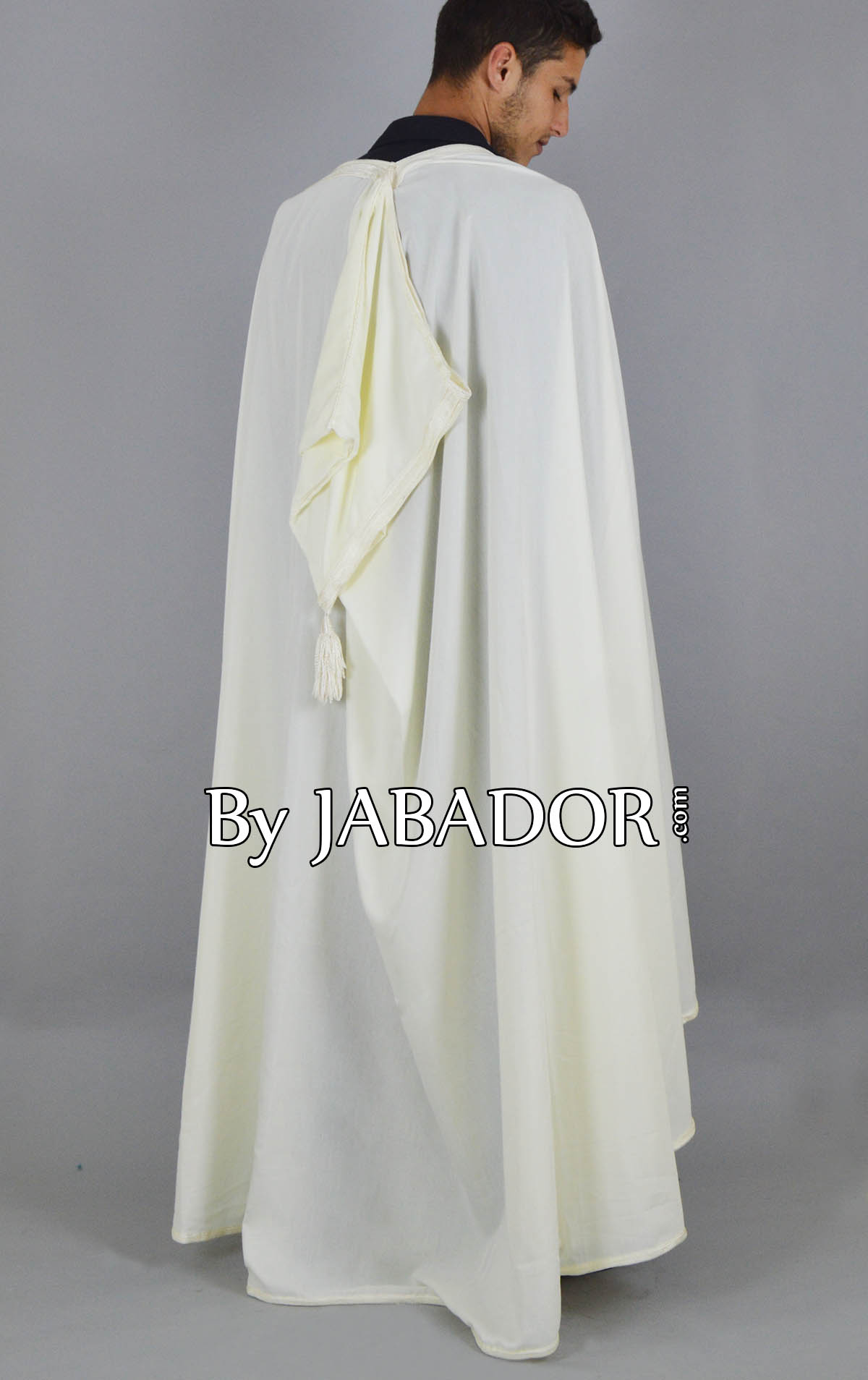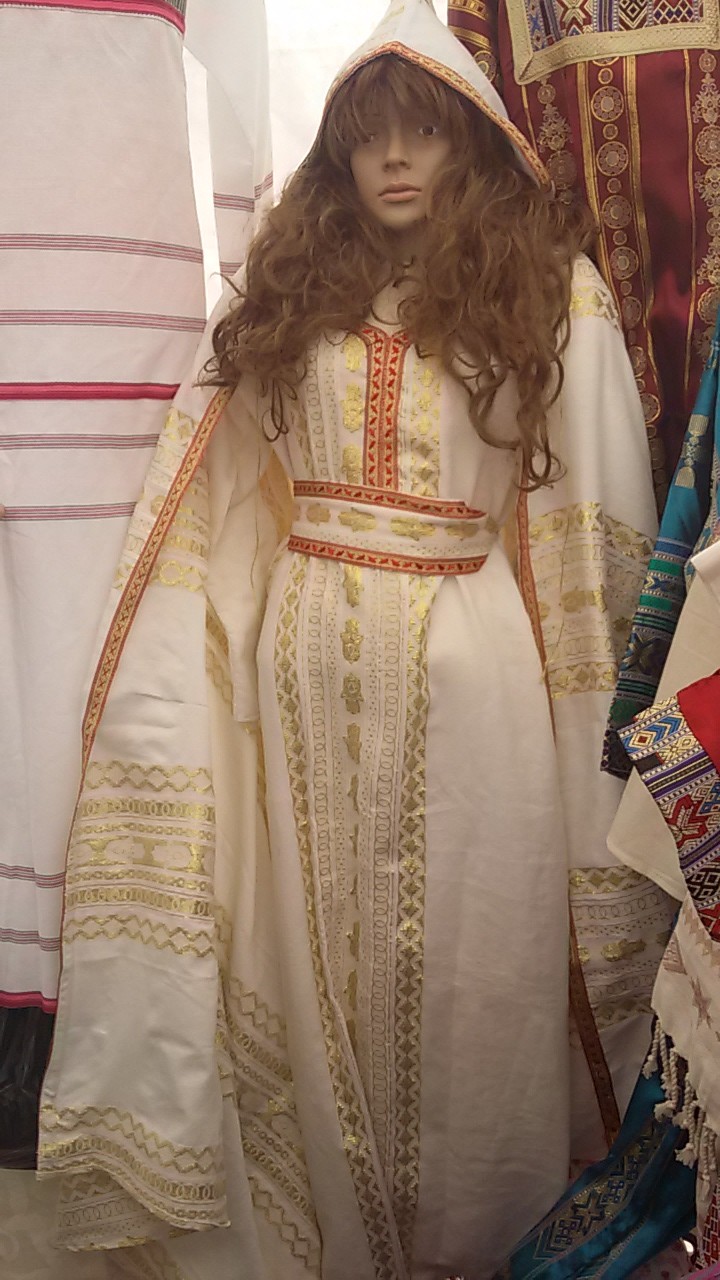
Pin on Habits traditionnels de Tunisie de magnifiques bijoux faits à la main pour
A burnous pleat is a great way to reduce bulk at the waist by taking away fabric from the waistband, and it can also get you around corners of a square of fabric. And the more I study 1888, the more ways I find to incorporate the pleat. Lets start simple, with this example on the right. This is the back panel of an overskirt from 1879, and is.

صور البدرون العاصمي الجزائري مقدمة من مختلف المجلات النسائية Traditional outfits, Fashion
Burnous, on the other hand, are more lightweight and breathable, making them a better choice for warmer climates. Cultural Norms. In some cultures, the choice between a cloak and a burnous is dictated by tradition. For example, in Morocco, the burnous is a traditional garment worn by men and women alike. It is typically made from wool and is.

Burnous algerien femme Amber Daniels
Selected Solo Exhibitions. 2018. I Colori dell'amicizia, Issiakhem: mano monca, immaginario in fiamme, Ex Fornace Gola, Milano, Italy. 2015. Issiakhem à Relizane, Maison de la Culture, Relizane, Algeria. 2010. M'hamed Issiakhem, Musée Public National d'Art Moderne et Contemporain d'Alger, Algiers, Algeria Hommage à M'hamed Issiakhem, University of Béjaïa, Béjaïa, Algeria

Burnous Femme Artisans d'Art
Sufism terminology A burnous , also burnoose, bournous or barnous, is a long cloak of coarse woollen fabric with a pointed hood, often white in colour, traditionally worn by Arab and Berber men in North Africa. Historically, the white burnous was worn during important events by men of high positions.

Pin by Khaddouja on Caftan & jellaba Moroccan fashion, Abaya fashion, Hijab fashion
A burnous ( Arabic: برنوس, romanized : burnūs ), also burnoose, bournous or barnous, is a long cloak of coarse woollen fabric with a pointed hood, often white in colour, traditionally worn by Arab and Berber men in North Africa. [1] Historically, the white burnous was worn during important events by men of high positions.

Épinglé sur Maroc
Published on May 10, 2012 Terminology: what is a burnous? written by The Dreamstress The burnous, both in name and design, is of Arab origin, and describes a full, hooded cloak, often decorated with embroidery and tassels. Algerian burnous from The Queen Magazine, August 30, 1873, via Koshka the Cat It can also be spelled burnoose and bournouse.

burnous mariage Dresses, Victorian dress, Fashion
In May 2011, Architect Barbie made her debut at the American Institute of Architects (AIA) National Convention in New Orleans. The more than twelve thousand AIA members in attendance, an overwhelmingly male crowd (only 16 percent of AIA members are women), must have been surprised to encounter the pink-and-white Mattel booth in the vast exposition hall, which was occupied primarily by.

KarakoAlgeria Moroccan fashion, Algerian clothing, Traditional outfits
Arabe d'El Aghouat en Burnous. Symbole de la perfection, il est très prisé par tous les notables d'Afrique du nord et de pays arabes. En Kabylie, par contre, le Burnous est réalisé à base de laine de mouton ou de brebis. Traditionnellement confectionné à la maison par les femmes, le métier s'y transmet de mère en fille.

Robe longue avec burnous tunisiens faits de tissu tissé main ( Hayek ) et brodé au fil … Tenue
The GSA article reprinted above contradicts the GSA article reprinted below in terms of style for the Dillon Courthouse: Art Moderne style above, but Stripped Classicism, Starved Classicism—or PWA Modern below. Construction for the building was completed in 1936, in general, the decade of Art Moderne style. The style of this building, however, - in my opinion - is not accurately described by.

Pin by YVES MAROC on amazighe Fashion, Traditional dresses, Women
Le burnous est un vêtement traditionnel largement porté dans les pays arabes et nord-africains. Anciennement conçu pour se protéger contre le froid, il est devenu un élément de mode incontournable pour les adultes comme pour les enfants.

Appelé Selham au Maroc ou encore Burnous en Algérie cette cape à capuche de mariée cousue main
Peinture mixte sur toile Italienne de lin Grammage : 300 gDimensions : 85x 85 cmEncadrement en caisson américain couleur bleue tropiqueTechnicien utilisée :.

جديد تصديرة عروس 2015 Traditional outfits, Traditional dresses, Algerian clothing
Jun 2, 2020 - Explore Finezine's board "Capes, burnous, jacket, abaya, kimono.", followed by 147 people on Pinterest. See more ideas about caftan, kaftan, fashion.

Pin by rania haoues on Robe Algerian clothing, Dresses, Fashion
Victorian Shawl Crochet Pattern pdf DOWNLOAD 1891 Star Fascinator Cape Femme Fatale DOWNTON ABBEY Historic Reenact DakotaPrairieTreasures (927) $ 4.99.. Authentic Antique French European 1910/1920s Seersucker Burnous Hood Cape Parisienne Lady Fashion Doll Haute Couture Kamkins Paul Poiret-era (283) $ 99.99.

Moroccan clothing, Moroccan dress, Moroccan fashion
The archetype of la femme moderne was particularly identified with the world of fashion. Roberts argues that the fashions of the 1920s acted as a "visual analogue of female liberation", 21 and points out that their strongest critics complained of "their effect of reversing or blurring the boundaries of sexual difference, enabling women.

Épinglé par Safoura Salvi sur Tenues Traditionnelles Algériennes ♥️ en 2021 Robe de mariée
Victorian burnous were made from silk velvet or cashmere, sometimes embroidered, or made from lace. The draping hood at the back and decorative silk tassels provided a hint of exoticism. Burnous were fashionable from the 1850s to the 1870s. Our project's Craft Specialists, Anne Eunson and Kathleen Anderson, have studied the burnous in detail.

Pin by Majid Sefrioio on caftan romeo Moroccan dress, Velvet dress designs, Fashion
A burnous is a man's hooded cloak traditionally worn in North Africa, especially Morocco. There is a particular example that is now in the Royal Collection, London (RCIN 61156). It is believed to have been owned by the French Emperor, Napoleon Bonaparte, and taken after he was defeated at the Battle of Waterloo (Belgium) on 18 June 1815.